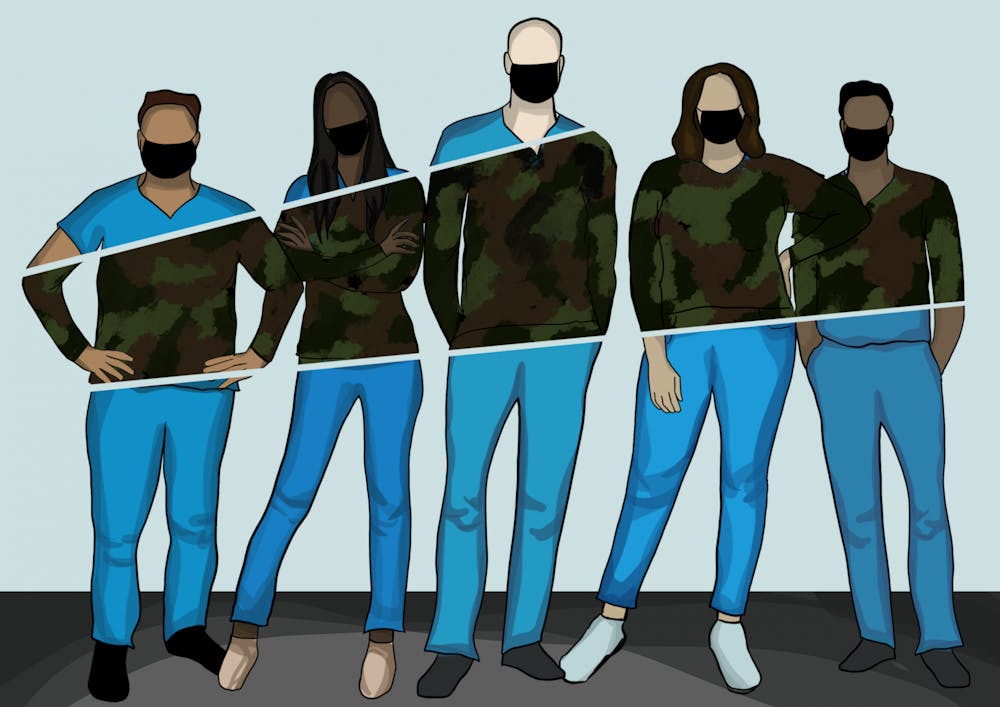Since last March, everyone from Donald Trump to the WHO director-general has used warlike imagery to describe the COVID-19 pandemic. The dramatic flair is admirable, but not only is this sort of language bad at improving our public health response, it also reinforces harmful ideas about how society should address its problems.
In March, Trump tweeted that “The world is at war with a hidden enemy. WE WILL WIN!” We haven’t won, at least not yet, but the call to arms has been replicated by the constant use of metaphors, such as “frontline workers” and the “battle against COVID.”
To some extent, this language makes sense — we would like to eliminate as many novel coronaviruses as possible, after all. However, the best way to stop the spread of COVID-19 isn’t to aggressively seek and destroy the virus, it’s to stay home as much as possible. And watching Netflix alone in your apartment isn’t exactly what comes to mind when one hears a state governor declare that “this is a war.”
Ultimately, the militaristic language will always fall flat because the pandemic isn’t a war; it’s a public health crisis. “Frontline workers” aren’t soldiers — they’re doctors, nurses and the rest of the essential workers. Of course, this doesn’t mean they’re safe: more American healthcare workers have been killed during the pandemic (3,248 since Jan. 20) than American soldiers during the entire war in Afghanistan (2,313). On the other hand, not a single nurse has ever attacked a Doctors Without Borders hospital with an AC-130U gunship.
While the U.S. isn’t actually at war with COVID-19, it is at war and has been since before this year’s USC freshmen were even born. The militarized language we use to describe COVID-19 isn’t just an ill-fitting metaphor, it’s a symptom of a country that has become so heavily militarized it refuses to do anything but war.
The military has an almost religious status in the United States. We worship during our military appreciation football games and tithe in the form of multi-billion dollar defense appropriations. This religion is necessary if our country wants to fight a war for almost 20 years — not only does the military need recruits and workers to build tanks and bombs, it needs citizens who are conditioned against speaking out against the military.
Americans’ devotion to the military means we’re primed to respond to this sort of warlike language, which makes the “pandemic-as-a-war” idea very tempting to those in charge. Both Donald Trump and Joe Biden are focusing on “reopening” the country before the pandemic is over, and it seems inevitable these plans will lead (and already have led) to avoidable deaths.
Without describing this response using militarized language, one might correctly see it as brutal capitalist exploitation designed to generate maximum wealth for an elite few at our expense. On the other hand, if the response is actually a “war with a hidden enemy,” then we’re not cogs in a heartless economic machine; we’re brave patriotic warriors. And when people die? Well, that’s what happens during war — after all, we’re frontline workers, whatever that means.
Of course, wars and pandemics are not the only things that require public support. Society needs cooperation in the form of public education, socialized healthcare, public housing and countless other areas. These are ways the U.S. fails; our healthcare system is the most expensive in the world and our higher education isn’t much better.
We fail to guarantee our citizens these things because, just like a successful pandemic response, they can’t be achieved by pretending to fight a war. This hasn’t stopped our government from trying, though – just look at the “war on drugs” and the “war on poverty” – in addition to the more recent “war on COVID.”
How are these metaphorical “wars” going? Well, in December the CDC announced 2020 saw the “highest number of drug overdose deaths ever recorded in a 12-month period.” That same month, University of Chicago researchers estimated that 11.7% of Americans live in poverty, and as of Jan. 24, COVID-19 has killed over 418,000 Americans.
Maybe we should find a new metaphor.

